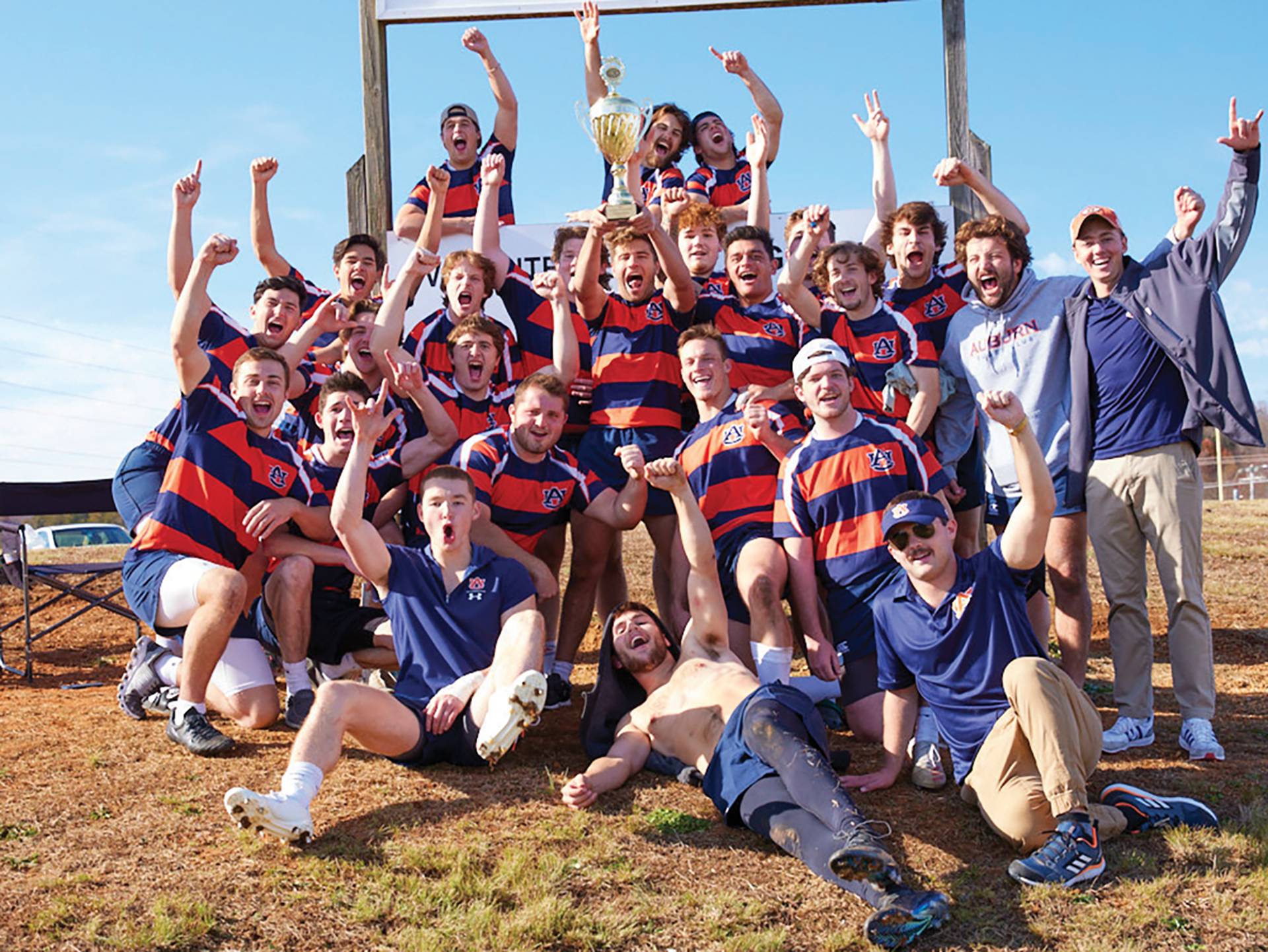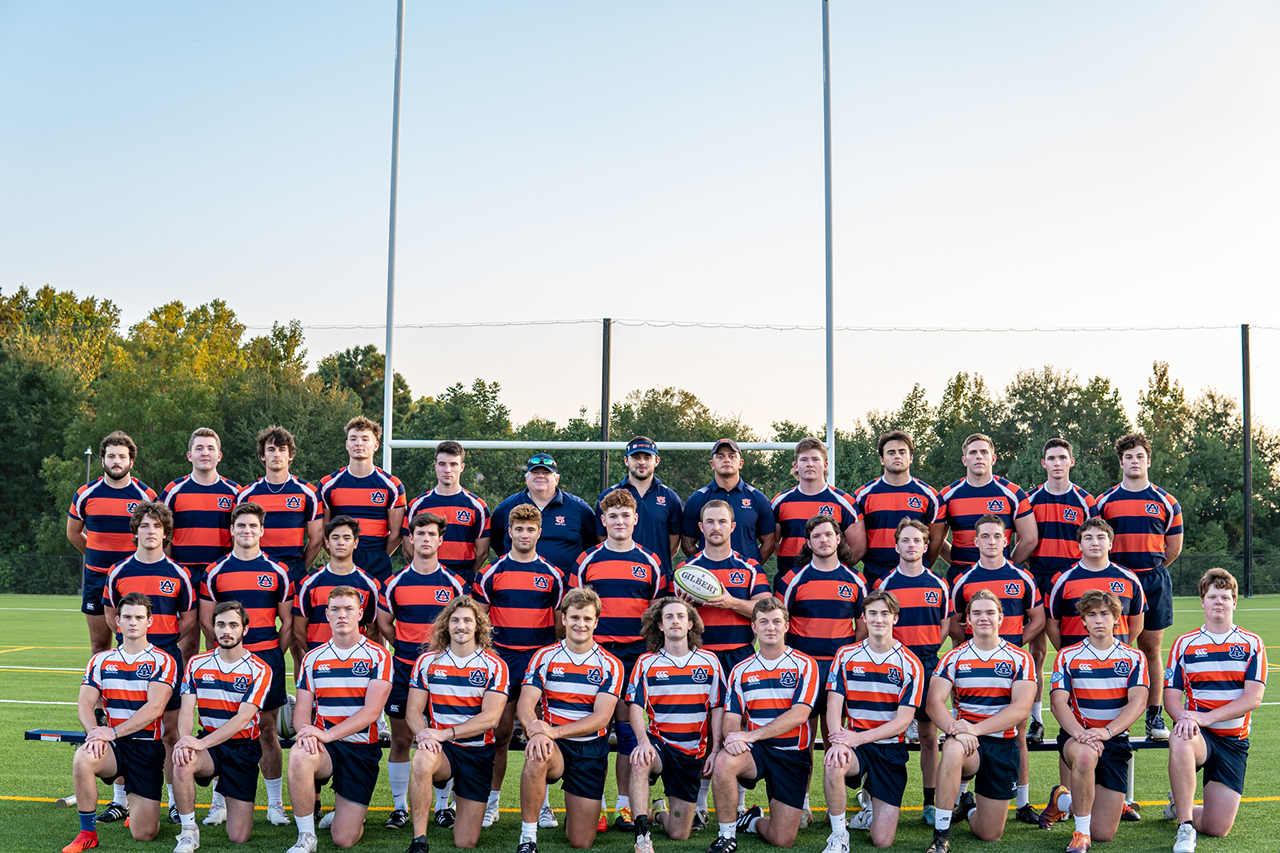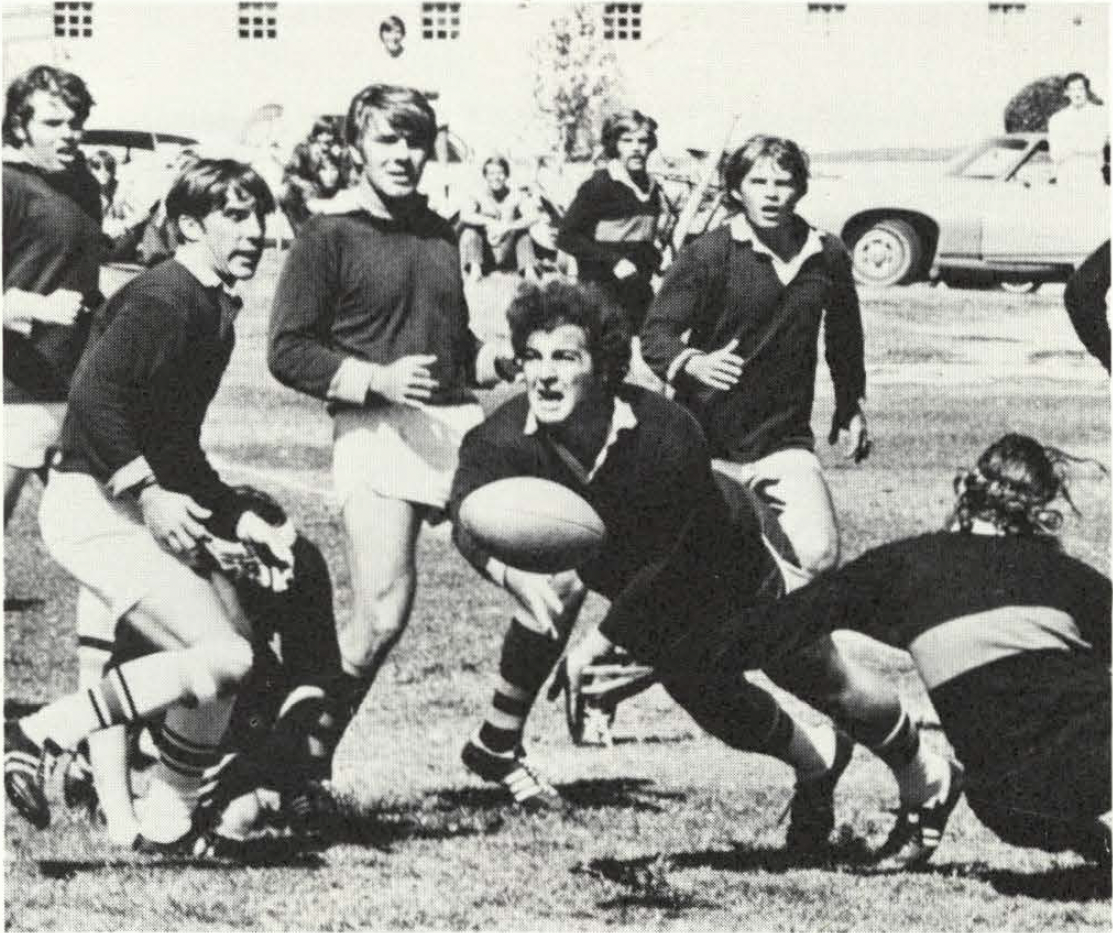For decades, Auburn’s Rugby Club fought for relevance as much as victory. Then they were national champions.
By Derek Herscovici ’14

“For he today that sheds his blood with me shall be my brother” William Shakespeare, “Henry V”
They lined up 15 men to a side, each tense with concentration. Over the next 80 minutes the two teams’ fates would be determined through bone-rattling hits, tactical precision and an all-out team effort in the pursuit of victory. And it would all be played without pads.
Auburn University versus Montana State for the 2021 Division II College Rugby Championship.
Self-coached, self-recruited, self-funded—the story of the Auburn Rugby Club’s rise to national prominence is burnished with hard work, personal touch and perseverance—hallmarks of the Auburn Creed. Perennial underdogs, the Tigers would cap their season with the most improbable moment in the program’s more than 50-year history—a national title.
“I know somebody in just about every country because of rugby,” said Prather. “Because of rugby you might have a job offer, a place to stay. You have friends no matter where you go.”
He found a kindred spirit in Sam Parks, vice president of human resources for Global K9 Protection Group. Parks discovered rugby as a youth, and it guided him virtually everywhere he went, from attending college at Oxford to playing for clubs in Ireland. After he and his family moved to Auburn, it felt natural to contact the local club and lend a hand.
“I was welcomed by a group of criminals, doctors, lawyers, you name it,” said Parks, the team’s assistant coach. “People understand and respect the commitment and sacrifice it takes, so when you meet other [rugby] people, there’s a real camaraderie.”
Bonded by the sport, Prather and Parks embarked on a recruiting tour to build a team of student-athletes familiar with the game. Auburn’s national recognition proved an easy sell for out-of-state students. With little more than a plan—and a promise—they recruited five players from around the country to the Plains.
“Everything was equal between Auburn and a bunch of other Power Five schools, except the rugby program,” said Prather. “The only reason the students came to Auburn, all five, was to come play rugby here. We looked at their parents and said, ‘We will help your kids not only become better rugby players, but better people.’”

“From underdogs to champions, the Tigers had finally earned the respect of teams and sportswriters around the country.”
Among the new recruits was Danny Helton, a junior from Nashville who fell in love with rugby in high school and served as captain during the 2021 season.
“We had a lot of new guys come out who were great athletes, but they’d never touched a rugby ball, and within a season, they were already high-performing players,” said Helton. “We’re seeing the new guys turn into the veterans, and they’re passing on knowledge to the new guys. You get a lot of individual skills and knowledge from the players above you, then the coaches come together and lead the team in the right direction.”
Easily one of the most unique coaching dynamics in Auburn’s history, Prather and Parks couldn’t be more different. Parks is “old school”: soft-spoken, focused on player development and conditioning. Prather, a student of the modern game and a keen tactician, is a sometimes volcanic presence on the sidelines, bellowing commands from one side of the pitch to the other.

The 2022-2023 Auburn University Rugby Club. The coaches, in blue, are (L-R) Sam Parks, Nick Prather and Niko Spino ’23.
For years Auburn had consistently ranked at or near the bottom of the Southern College Rugby Conference (SCRC), the Division II (DII) conference for schools in the SEC and around the South. Since the team was unable to practice or play for the majority of 2020 due to COVID, expectations were already low.
Compounding the issue was the team’s status as a club sport, making it ineligible for funding from the Auburn Athletics Department that would go toward recruiting players, buying new equipment and paying for team travel to away games.
In years past, club teams like Auburn played in small-college or DII divisions against teams with similar financial situations. But larger schools with fully funded varsity or even “pseudo-varsity” teams have recently been entering into lower divisions to develop their program and dominate their schedule. In 2021, the year Auburn won the DII national championship, they were the only nonvarsity team to reach the Final Four.
All this is to say that the odds were against them. Yet day after day, through a nine-game season, the team grew stronger until the Tigers at last reached their goal of a postseason berth.
Their playoff entry meant a rematch with Georgia Tech, who tied Auburn on a technicality in the first game of the season. The Tigers would not be denied twice, winning 24-22 in gutsy fashion.
Next, against national powerhouse Memphis in the SCRC title game, Coach Prather identified a strategic weakness that sprung the Auburn counterattack and suffocated the opponent. The final score, 25-15, suggests a game closer than it was.
On Dec. 4, 2021, at the College Rugby Fall Classic in Charlotte, N.C., Auburn defeated Montana State 31-12 for the American College Rugby/SCRC Men’s DII Championship. At long last the Tigers were on top.
“That Montana State game in the championship was one of the hardest-hitting games I’ve ever seen, and I’ve played for 30 years all over the world,” said Parks.
The Tigers flew home with the trophy in hand, while their 23-year-old head coach flew home with alumni on a private jet—a surreal ending for such an unremarkable beginning.
“I had never coached a team at anything, and I had been out of the game for about year with my first year of vet school and COVID,” said Prather. “But I am luckier in a sense that no team I’ve ever been a part of had been so coachable and loved each other like this one.”
The national conversation on Auburn changed with their victory that day. From underdogs to champions, the Tigers finally had earned the respect of teams and sportswriters around the country.
“In the end, Auburn, a program that has not been prominent on the national stage for a long time, showed they can not only win their conference, but win across conference boundaries as well,” wrote the Goff Rugby Report of the championship. “And for Newman [Garrett Newman ’22], who just took up the game recently, it was an MVP day.”
Wayne Wolfe, who joined the team in 1971 as a student, vividly recalls the haphazard conditions of the field the early teams played on.
“We played games usually on Sunday, sometimes following an Auburn football game,” said Wolfe. “Our ‘pitch’ was on the west side of Jordan-Hare Stadium, which was used to park cars and tailgate. They would somewhat clean the pitch before a match, but we would find ourselves rolling in chicken bones and broken bottles!”
Wolfe and teammate Howard Porter met with Athletic Director Lee Hayley, who promised to help find a new field and invited the team to play a demonstration match during halftime of the spring 1973 football game as a gesture of support. Eventually the field at the intersection of West Thatch Avenue and Hemlock Drive, across from the Farmhouse and Tau Kappa Epsilon fraternity houses, became the AURC’s home for the next 40-plus years.
The sport surged in popularity during the 1970s. Even Auburn President Harry M. Philpott’s son, Cabell Philpott ’75, played on the team, and the president could often be seen watching from the sidelines.
At the time, Auburn played year-round in the Georgia Rugby Union (GRU), often against older, more experienced teams.

A player on the 1973 Auburn Rugby Club goes all in to complete the play.
Despite the physicality of the sport in the 1970s and ’80s, Auburn won its GRU division in the 1982-83 season—its first such championship of any kind.
“It used to be called ‘Cowboy Rugby’ when I played, and things have improved dramatically since that time,” recalled Mark O’Neill ’88. “Auburn Rugby at our peak in the early ’80s was based on a fast, physical pack and the occasional aligning of the gods that gave us some backs that would tackle, and one who could kick—Mark Kribel ’85. One season—1981?—we beat Alabama like 11 times.”
Auburn built its reputation as the 1980s progressed, but off the field, a different kind of challenge was far from over—the scrum for funding. To compete, the players had to find ways to finance their own team.
The Rugger Huggers, the team’s “little sister” group, supported the club through bake sales and T-shirts. In other instances, personal donations from players and alumni were required. Once, in 1982, the AURC auctioned off a 1975 Buick LeSabre to raise money for the team. One-dollar chances were sold outside Haley Center, with the winner announced before the game against the Fort Benning Flyers.
Circumstances were already dire when a bizarre coincidence—a rumor that hazardous chemicals had been dumped at the site of the future rugby pitch back in the 1950s—prompted an EPA investigation. No evidence was found, but, unable to practice or play home games, the AURC went on hiatus from 1987-1990.
Upon its return, the AURC was once again met with widespread support across campus. A women’s rugby club was established in 1992. Hardly a decade later, in 1999, now playing in the SCRC, Auburn won the DII conference championship, becoming the first Southeastern team to win a game at the national level. In 2013 they did it again.
“Winning the SCRC Championship in 2013 is one of my favorite memories—we rolled Toomer’s Corner when we got back in town,” recalled Morgan Bevins ’16. “Also the ‘Prom Dress Rugby’ with the women’s team. My wife [Karen Dillon ’16] played on the women’s team, and we met each other on the sidelines. My old Auburn teammate—and current Birmingham Vulcan teammate, Tyler Taunton ’15—was the officiant at our wedding.”

“It used to be called ‘Cowboy Rugby’…” Mark O’Neill ’88
Though their defense of the national title came up short, 2022 was another hard-fought season that further established the Auburn brand of rugby. Coaches Prather and Parks have already recruited 10 incoming student-players to the team—some away from previous commitments—and are poised to replenish a deep roster with even more experience.
Contributions from alumni like Howard Porter ’73, who’s established scholarships and matched funding, have gone a long way toward strengthening the foundation he helped lay as a player decades before.
“This current team is an incredible bunch of young men—outstanding character, incredible athletes and destined for greatness in a variety of fields,” said Porter. “You’ll never know how great the game is until you lace up the shoes and get out there.”
Long gone are the days of scrumming in chicken bones and beer cans. The Tigers’ new home, located inside a brand-new $22 million-dollar Sportsplex completed in 2020, has five multipurpose turf fields for clubs, intramurals and student recreation. It was funded entirely through student fees.
For Coach Prather, whose time in veterinary school—and at Auburn—is coming to a close, the team’s elevation to contender is one he can still savor, no matter how bittersweet. And yet, he gives Auburn the credit.
“Auburn sells itself,” said Prather. “To see alumni and friends who don’t know a single kid on the team wearing Auburn rugby gear in the cold, cheering us on as we win our first playoff game since 1999—it just shows the sustainability this program can have if given the right opportunities.”
An Eye for Action
From the mound to the mountain, Blake Gordon ’03 has captured life on the edge.
Charting Her Course
From Auburn’s campus to the world’s most advanced warships, Emily Curran ’10 has never forgotten where she found her footing.
Building a Brand, Cultivating a Community
A fashion emergency and a social media surge helped Kayla Jones ’18 launch her brand Women With Ballz.
An Eye for Action
From the mound to the mountain, Blake Gordon ’03 has captured life on the edge.
Charting Her Course
From Auburn’s campus to the world’s most advanced warships, Emily Curran ’10 has never forgotten where she found her footing.
Building a Brand, Cultivating a Community
A fashion emergency and a social media surge helped Kayla Jones ’18 launch her brand Women With Ballz.


